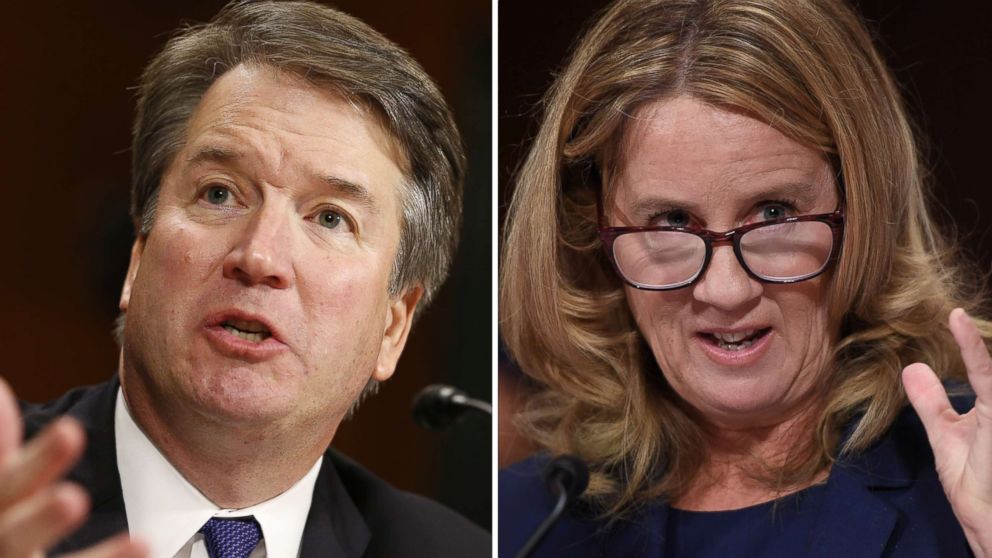Raw divisions exposed, as emotional hearing devolves into partisan anger: ANALYSIS
It was emotional. It was wrenching. It was tense. It was sad.
Then, as the nominee himself took his turn, it turned angry. It turned indignant, deeply personal, and emotional again.
Christine Blasey Ford and Brett Kavanaugh both choked up speaking their own words on Thursday, in a long, extraordinary day of testimony before the Senate Judiciary Committee.
Those words spoke alternative truths – utterly incompatible versions of events from 36 years ago. It is now left to a damaged political system to make sense of it all, with a lifetime appointment on the Supreme Court among the stakes that have only grown as days have passed.
Senators who don’t trust or much like each other will be charged with settling a vicious debate – with President Donald Trump hardly a bystander, or a predictable force. A day that held the hope of providing some clarity only cemented divisions.
The power of Ford’s words came in the chilling details she offered. She said she has “100 percent” certainty that Kavanaugh tried to rape her while a friend looked on, and she quieted the hearing room with her recollection of what stands out in her mind all these years later.
“The laughter,” she said, “the uproarious laughter between the two, and them having fun at my expense.”
Kavanaugh vehemently denied it all. He went further, alleging a coordinated effort by the left to slime his reputation – to win at any cost, up to and including that of a reputation he said would be permanently tarnished.
“What goes around comes around,” he warned. “This is a circus. The consequences will stem long past my nomination.”
In crass political contexts, Ford emerges as a likely hero to the left. She spoke extensively about traumatic memories from her teenage years, and spoke in front of an audience of millions under unthinkable strains and pressures.
“I am here today not because I want to be,” she said. “I am terrified.”
In the less than two weeks since she came forward with her story, she inspired countless women to speak publicly about their own memories of long-ago sexual violence.
“Bravery is contagious,” said Sen. Patrick Leahy, D-Vt. Chairman Chuck Grassley, R-Iowa, even used the same word to describe Ford after her testimony wrapped: “bravery.”
But any sense of potential closure or comity ended the moment Kavanaugh started to speak. He tore into Senate Democrats, saying they sought to destroy his reputation via an “orchestrated political hit,” fueled by “apparent pent-up anger about President Trump,” and “revenge on behalf of the Clintons.”
Kavanaugh displayed a partisan streak that was unusual for a sitting federal judge and a Supreme Court hopeful. As Democrats are quick to point out, he grew up in Republican politics, from Ken Starr’s independent counsel probe of Bill Clinton through Bush v. Gore and the George W. Bush White House.
His was an entirely different approach than that of Ford. Kavanaugh seemed downright disdainful of Democrats’ questions, at times returning questions about his behavior in high school and college with questions back about whether the senators drank to excess themselves.
Kavanaugh is likely to emerge as a partisan hero himself. Sen. Lindsey Graham – once a Trump critic, now a close ally – pronounced himself ready to vote enthusiastically to confirm the judge, while angrily calling out his Democratic colleagues.
“This is the most unethical sham since I’ve been in politics,” said Graham (R-S.C.). “I hope that the American people will see through this charade.”
GOP senators had brought on a female prosecutor to question both witnesses, but Graham took over questioning of Kavanaugh himself. The prosecutor, Rachel Mitchell, did not speak again for the balance of the hearing.
Now, the same panel that struggled through Thursday’s emotions votes on Friday to send Kavanaugh’s nomination on to the full Senate. The important audience remains roughly five senators – a few Republicans, a few Democrats – whose votes are still in question.
It all funnels toward a political moment that few could have wanted.
But it seems in some ways a perfect, if uninspiring, distillation of the nation’s divisions. A real world filled with uncertainties - of human disagreements, faulty recollections, and deep shades of gray – will be settled in votes that will stand in black and white, and maybe red and blue.




